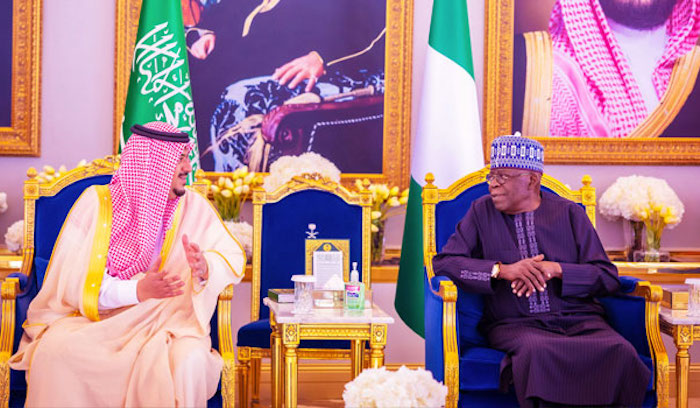
The Government of Saudi Arabia on Friday announced plans to invest in the rehabilitation of Nigerian refineries.
The Kingdom also said it was ready to support Nigeria’s foreign exchange reforms through a substantial deposit aimed at enhancing the country’s forex liquidity.
The commitments were made during a bilateral meeting between Saudi Crown Prince, Mohammed bin Salman Al Saud, and President Bola Tinubu at the Saudi-Africa Summit in Riyadh.
Nigeria’s Minister of Information and National Orientation, Mohammed Idris, disclosed this in a statement he signed on Friday titled ‘Saudi government to invest in Nigeria’s refineries, support Central Bank reforms.’
Crown Prince bin Salman, who lauded President Tinubu’s economic reforms, pledged Saudi Arabia’s backing in ensuring that Nigeria achieves its potential as Africa’s leading economy.
He also identified Agriculture and Renewable Energy as potential sectors for investment, contributing to Nigeria’s food and energy security.
These announcements were further underlined by the Prince’s revelation that Saudi Aramco, the kingdom’s state-owned oil entity, will lead the refinery investment efforts.
The project’s completion is targeted within a two-to-three-year period, promising a significant boost to Nigeria’s refinery capabilities.
Moreover, the Crown Prince acknowledged Nigeria’s role and partnership within OPEC+, expressing gratitude for its consistent support.
On his part, President Tinubu expressed his gratitude for Saudi Arabia’s proposed investments and reforms support.
He assured the Saudi leader of Nigeria’s commitment to prudent management and strict oversight of the investments.
The two leaders also agreed to collaborate closely over the next six months to create a detailed road-map and blueprint to actualise the agreed investments and initiatives.
President Tinubu and Crown Prince bin Salman alsodiscussed the critical need to enhance security cooperation.
They beamed their focused on combating terrorism, curbing illegal migration, and addressing other security challenges in West Africa and the Sahel region.
Friday’s bilateral talks also served as an opportunity to explore the expansion of economic and socio-cultural ties between Nigeria and Saudi Arabia.
Both leaders committed to exploring new horizons in Nigeria-Saudi bilateral relations.
High-ranking officials including the Minister of Foreign Affairs, Yusuf Tuggar; Minister of Information and National Orientation, Mohammed Idris; Nigerian Ambassador to Saudi Arabia, Yahaya Lawal; and the state Chief of Protocol, Adekunle Adeleke, were present at the bilateral talks.
The Nigerian Government expects its four oil refineries to be operational by the end of 2024, with the Port Harcourt plant to become operable by December 2023.
Despite investing $25bn on renovating the Kaduna, Port Harcourt and the Warri refineries in the past 10 years, the facilities still function below 30 per cent of their potential output, a report by the 9th National Assembly shows.
The report called for a forensic audit of these efforts and recommended rehabilitating the Warri and Port Harcourt refineries. It also recommended audits on the Kaduna refinery.
Consequently, the Senate constituted an ad-hoc committee to investigate the NNPCL over the N11.35 trillion spent on the turnaround maintenance of the refineries.
The committee was meant to interrogate the Federal Ministry of Petroleum Resources, NNPCL, the Nigerian Upstream Petroleum Regulatory Commission, and the Bureau of Public Enterprises on the best approach to commercialise and ensure the profitability of the state-owned refineries.
But addressing State House Correpondents at the end of the 2023 Cabinet Retreat on November 3, the Minister of State for Petroleum Resources, Heineken Lokpobiri, announced that the responsibility for the timely renovation squarely fell on the Nigerian National Petroleum Company Limited.
He said the overhauling of the three refineries would curtail fuel scarcity.




